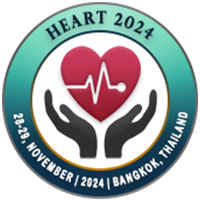
Ismaheel Azeez
Nigeria, University College Hospital, NigeriaTitle : Treatment response in adult hypertensives attending a secondary health care center in South-Western Nigeria
Abstract
Background: There has been an increase in the prevalence of hypertension globally and a trend towards poor control of hypertension. Despite the development of new guidelines on the management of hypertension, it remains a difficult disease to control.
Methods: The study was an intervention (before and after) study of 386 patients aged 18 to 70 years with uncontrolled hypertension. A simple random sampling technique with the computer-generated random numbers was used for selection of respondents.
Results: Majority (58.3%) of the respondents who were overweight had Diastolic blood pressure of less than 100mmHg while a minority (41.7%) of the respondents who were overweight had diastolic blood pressure of 100 mmHg to 110mmHg. A minority (42.1%) of the respondents who were obese had diastolic blood pressure of less than 100mmHg while a majority (57.9%) of the respondents who were obese had diastolic blood pressure of 100 mmHg to 110mmHg. However, the association was statistically significant (?2 = 9.845, p-value = 0.02). There was a significant difference between the mean first Systolic blood pressure and the mean third systolic blood pressure. (< 0.001, 95% CI 19.01- 23.04). Also, there was a significant difference between the mean first Diastolic Blood pressure and the mean third Diastolic Blood pressure (p < 0.001, 95% CI 11.13-11.56).
Conclusion: Respondents with higher body mass indices had higher blood pressures. After health education and counselling of the patients, there was a significant difference between the mean first diastolic blood pressure at first visit and the mean third diastolic blood pressure after two months. Also, there was a significant difference between the mean first systolic blood pressure and the mean third systolic blood pressure. The results showed that there was a significant reduction in the blood pressures of the respondents after the intervention.
Biography
Ismaheel Azeez is a Fellow of the West African College of Physicians (family medicine) with special interests in lifestyle medicine and evidence-based medicine. He had also completed master’s degrees in clinical epidemiology and internal medicine at the Universities of Ibadan, Nigeria, and Edinburgh, United Kingdom, respectively. He works with the University College Hospital, Ibadan, as a consultant family physician. He has over ten publications that have been cited more than 140 times and his publication h-index is 2.

